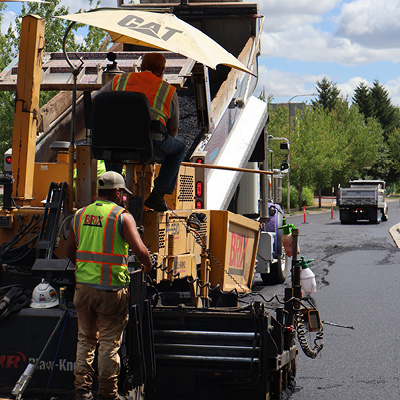Checking Out the Various Kinds of Asphalt Paving and Their Benefits
From the durable features of Hot Mix Asphalt to the eco-friendly features of Recycled Asphalt Sidewalk, comprehending these options can dramatically affect task end results. Technologies such as Warm Mix Asphalt and Porous Asphalt present additional layers of effectiveness and sustainability.
Warm Mix Asphalt
When considering one of the most effective paving remedies, hot mix asphalt (HMA) stands apart as a leading option for lots of applications (paving service). HMA is a functional leading product understood for its longevity, adaptability, and total efficiency. It is generated by home heating asphalt binder and incorporating it with accumulations at heats, making sure a consistent blend that can stand up to different environmental conditions
One of the primary benefits of HMA is its capacity to give a smooth, skid-resistant surface area, improving security for cars and pedestrians alike. Additionally, HMA shows superb resistance to contortion, making it excellent for high-traffic areas such as freeways and parking area. Its flexibility to various climates further adds to its extensive use.
The installation procedure of HMA is relatively quick, permitting effective project conclusion with very little disruption to traffic. It can be reused, decreasing waste and advertising sustainability within the building industry. paving service. In general, warm mix asphalt stays a leading option for leading experts due to its durable performance attributes and long-term cost-effectiveness, making it a reliable option for various facilities needs
Warm Mix Asphalt
Cozy mix asphalt (WMA) provides a cutting-edge alternative to warm mix asphalt, providing comparable benefits while needing lower production temperature levels. Usually generated at temperatures in between 190 ° F and 250 ° F, WMA modern technology decreases power consumption and greenhouse gas discharges throughout manufacturing, making it a much more eco-friendly choice.
Among the key advantages of WMA is its prolonged workability duration. The lower temperatures enable extra efficient transportation and positioning, specifically in cooler weather conditions. This adaptability can bring about improved compaction and general toughness of the asphalt surface area. Additionally, WMA can be used in different applications, varying from freeways to household driveways, without compromising performance.

The incorporation of additives or modified binders in WMA adds to its boosted buildings, ensuring that it meets or exceeds efficiency criteria. WMA's minimized thermal impact during manufacturing can reduce the possibility of damage to the surrounding setting, making it an attractive choice for lasting paving methods.
Cold Mix Asphalt
Cold mix asphalt is a versatile leading solution generally used for short-lived repair work and low-traffic areas. This kind of asphalt is created at ambient temperature levels, making it a convenient option for fast repairs and tasks where traditional hot mix asphalt might not be feasible. The blend generally contains asphalt binder, accumulation, and additives, enabling it to continue to be workable for a prolonged duration.
Among the primary benefits of cool mix asphalt is its convenience of application. It can be installed without specific tools, making it accessible for smaller service providers and DIY enthusiasts. Furthermore, cool mix can be used in various weather conditions, which is especially useful for urgent repair work requirements.

Cold mix asphalt is likewise cost-efficient, as it permits budget-friendly repairs without sacrificing quality. Its versatility makes it appropriate for patching fractures, loading splits, and resurfacing driveways. It may not offer the exact same long-term resilience as hot mix asphalt, its fast application and flexibility make it an exceptional option for short-term services and low-traffic applications. Overall, cool mix asphalt continues to be a sensible choice in the asphalt paving landscape.
(find out how)
Permeable Asphalt
Permeable asphalt is an ingenious paving solution designed to boost stormwater administration and decrease surface drainage. This kind of asphalt features an one-of-a-kind framework that incorporates interconnected gaps, enabling water to permeate via the surface and right into the underlying layers. By assisting in natural water drainage, porous asphalt helps alleviate the risk of flooding and lessens the concern on municipal stormwater systems.
Among the primary advantages of porous asphalt is its capacity to improve water high quality. As stormwater filters through the sidewalk, pollutants and debris are trapped, minimizing the number of pollutants that enter regional rivers. This contributes to much healthier communities and sustains compliance with ecological laws.
Furthermore, permeable asphalt can enhance the durability of the sidewalk itself. By decreasing water buildup externally, it lessens the potential for Get the facts freeze-thaw cycles that can result in fracturing and wear and tear. Moreover, the reduced requirement for typical stormwater administration framework can cause cost savings for districts and developers.
Recycled Asphalt Pavement
(try here)Recycled asphalt pavement (RAP) stands for a lasting approach to street building and construction and upkeep that benefits both the atmosphere and the economic situation. By reusing existing asphalt materials, RAP decreases the need for brand-new raw products, which in turn saves all-natural sources and decreases ecological impact. This practice reduces power usage and greenhouse gas exhausts connected with the manufacturing of new asphalt.
The incorporation of RAP into new pavement mixes can likewise cause substantial price financial savings. Contractors can leverage recycled materials to reduce overall project expenses, making it an economically practical option for towns and personal developers alike. Additionally, RAP provides comparable performance qualities to virgin asphalt, guaranteeing sturdiness and durability in road surfaces.
RAP's versatility permits it to be made use of in various applications, consisting of highways, parking area, and residential driveways. By boosting the architectural stability of existing pavements, RAP contributes to boosted security and smoothness of roadways.
Conclusion
To conclude, the varied kinds of asphalt paving each deal unique advantages tailored to details demands. Hot Mix Asphalt succeeds in toughness and fast installation for high-traffic locations, while Warm Mix Asphalt enhances sustainability via decreased power usage. Cold Mix Asphalt functions as an affordable choice for urgent repair services, Porous Asphalt efficiently takes care of stormwater, and Recycled Asphalt Sidewalk promotes ecological responsibility. Jointly, these paving remedies contribute to reliable, green practices in the building and construction market.